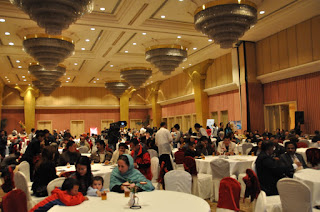From Banners to Bags: Turning the Tide of Waste in Kathmandu
Uma Shrestha has a secret weapon in her fight to clean up the piling garbage in Kathmandu, Nepal. It’s her beat-up sewing machine that stitches colorful and artistic bags made from one-time use and discarded Polyvinyl Chloride (PVC) banners.
Anyone who meets the 35-year-old native of Dharan, an urban locality in Eastern Nepal, often gets inspired on how flex banners made from polyvinyl chloride polyethylene plastics can be sewed into funky and practical bags.
Uma is one of the many young women who has received vocational training in sewing from Child Workers in Nepal (CWIN) – Self Reliance Center, a local NGO in Kathmandu, who supports youth at risk and marginalized women make use of recycled products as a source of income in their Banners to Bags (B2B) program.
The Banners to Bags program of CWIN is a social and environmental program based in Kathmandu, Nepal that uses discarded flex and fabric banners to create employment opportunities for youth at risk. Most of B2B’s raw materials are collected from dumpsites, NGO’s, schools and private offices that believe on the same cause. The up-cycled product from waste materials turned into better quality bags and document holders are later sold back to the donating organisations at a discounted rate, or other organisations that want to become involved.
The brains behind the B2B program are Laura McManus and Tara Nakashima, who for many years now, wanted to start a project that is both sustainable and gives back to the community. Laura and Tara lived in Kathmandu, Nepal and were part of a broader environmental campaign to get people thinking about creative and practical ways to reduce waste.
Today, there are six B2B women sewers with ages ranging from 15 to 21 years old, who are cutting and sewing the plastic banners and putting together a final product of colorful bags and document holders. “The banners are not useful at a certain point and they pollute the streets too. If we use these bags, it will help keep the streets of Kathmandu clean,” says Gairi Uprety, one of the women who received the sewing training from CWIN.
Once seen as the Himalayan Shangri-la, Kathmandu is increasingly plagued with environmental problems with 400 tonnes of rubbish per day littering the streets, clogging waterways and destroying ecosystems. At almost every turning of the city, a mountain of garbage is a sight to every pedestrians and tourists. The smell, sight and public health threat is harming Kathmandu’s economic future particularly its tourism industry.
Once seen as the Himalayan Shangri-la, Kathmandu is increasingly plagued with environmental problems with 400 tonnes of rubbish per day littering the streets, clogging waterways and destroying ecosystems. At almost every turning of the city, a mountain of garbage is a sight to every pedestrians and tourists. The smell, sight and public health threat is harming Kathmandu’s economic future particularly its tourism industry.
The valley is also witnessing a rise in cases of diarrhea and cholera as a result of lack of proper waste disposal and management. Insurmountable piles of the city’s garbage are contaminating the water systems and threatening the public health of its residents. Due to non-collection of garbage, people dump their waste in open areas or in nearby rivers and riversides which has further exacerbated the problem.
There is a need to change people’s perceptions about waste and its effective management. The public should play a responsible role in reducing, reusing and recycling waste,” says Sumitra Amatya, Executive Director of the Solid Waste Management Technical Support Centre (SWMTSC), under the Ministry of Urban Development.
For Banners to Bags team, the plastic bag became a symbol of that waste, so they started looking for ways to minimize the use of plastic shopping bags. The program of turning banners to bags is unique since they do not use a new material to create an alternative to plastic. Rather they utilize a waste material and breath new life into it. Krishna Shrestha, Program Officer of CWIN Self Reliance Center is proud of their success in finding job placements for the women in the B2B program. “When they graduate, they have the proper training needed to start their tailoring shops. We also give them seed money to start their own business.”
In the truest sense of sustainability, the Banners to Bags program of CWIN is educating the community on the detriments of one time use plastic bags and empowering youth with new vocational skills to support their living. Young women like Uma and Gairi don’t have to buy the sewing materials or pay the fees for the training. “The teachers inspire us a lot. We are underprivileged and came from very remote areas. We manage to earn just enough to feed ourselves and sometimes it’s even hard to do that. It’s almost impossible to buy raw materials and earn from tailoring, but this B2B program is helping us sustain our households,” they said.
This story appeared in Asian Geographic Magazine
Vol 97 Issue 4/2013
THE GREEN EDITION
More photos here: Banners to Bags



Comments
Post a Comment